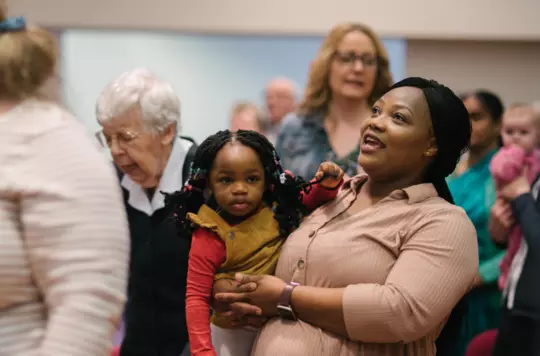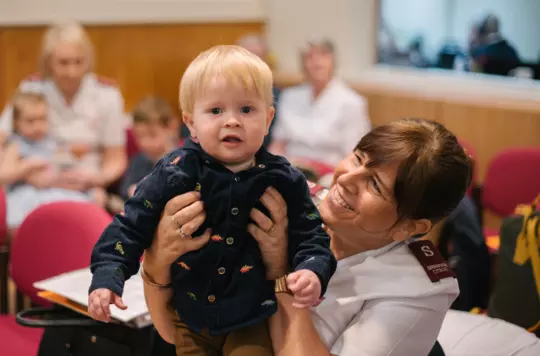26 October 2024
Ending the injustice of domestic abuse
Major David Betteridge

Major David Betteridge shares an update on research within The Salvation Army.
Recent research by Coventry University and the University of Leicester – In Churches Too: Church Responses to Domestic Abuse – demonstrates that the incidence of domestic abuse is just the same within the Church as it is outside the Church. Of course, this includes The Salvation Army.
In response to this, the Family Ministries Department commissioned PhD level research in partnership with the University of Leeds, to have a fuller picture of the situation within our own Movement. A survey was circulated by our outstanding researcher, Amy Quinn- Graham (Research and Development Department), which was subsequently completed by 172 people.
The data collected gives us insight into the various experiences of those who have disclosed domestic abuse, or chosen not to, within the context of The Salvation Army. Through this we can begin to identify and address any unhelpful or even harmful attitudes and practices highlighted.
Further research from the UK and beyond reveals how domestic abuse in the Church is surrounded by what Professor Nancy Nason-Clark (University of New Brunswick) called a ‘holy hush’. Many barriers stand in the way of Christian and church-attending victim-survivors from disclosing their experiences of abuse to their church leaders or community. These include harmful interpretations of Scripture that condone abuse as well as uninformed and ill-prepared individuals and structures.
Like all good qualitative research focused on people’s experiences, the survey data begins to give voice to those whose experiences have typically been brushed under the carpet.
Early analysis of a small section of the survey related to experiences of disclosing – or choosing not to disclose – domestic abuse within The Salvation Army reveals three issues that generate fear, which then becomes a barrier to victim-survivors sharing their experiences.
First, victim-survivors face a denial: the attitude that domestic abuse isn’t something that happens within The Salvation Army to The Salvation Army’s people. This silences victim-survivors, with some survey respondents explaining how they didn’t disclose domestic abuse because they didn’t want to lose their job or a position of leadership, including officership, or be judged by others within the Movement.
Second, victim-survivors experience a sense of danger: this is generated by the responses of officers/leaders who are not well enough equipped to deal with disclosures properly and safely. While no one expects them to be experts in addressing domestic abuse, respondents did want officers/ leaders to be able to respond well, and at least signpost to appropriate help and support. Some respondents, based on previous experiences, expressed a fear of being dismissed, of harm being compounded or of simply being ignored.

Some respondents, based on previous experiences, expressed a fear of being dismissed, of harm being compounded or of simply being ignored.
Third, there is distrust that any disclosure will remain confidential: trusting that someone would keep their confidence was the most significant consideration for those who said they would disclose domestic abuse to someone in The Salvation Army. Some respondents shared experiences of broken confidentiality, including accounts of corps officers following up on their disclosure with the abuser.
As director of Family Ministries, I am grateful to those survey respondents who have been brave enough to share some very difficult and distressing experiences.
The issue of domestic abuse is something that cannot be ignored, even though for many years attempts have been made to do just that, right across society. If we are true to the values of the Kingdom of God and The Salvation Army, this injustice cannot be allowed to continue.
I have a great deal of respect for territorial leadership, which has allowed Family Ministries to commission this research and take the necessary steps to address the failings it highlights.
You will see from The Salvation Army’s international positional statement on domestic abuse – approved by the General in June 2024 – that ‘The Salvation Army is opposed to domestic abuse ... is committed to standing with victims of domestic abuse ... and holding persons who abuse accountable’.
This reflects the Family Ministries Department’s desire to promote a God-given understanding of family. Scripture clearly tells us that everyone is created in his image (Genesis 1:26) and therefore has innate value. We are all part of this family and are called to love one another as brothers and sisters in Christ.
If the international Salvation Army is committed to ‘mutual respect and healthy relationships between people, and will speak against domestic abuse in all its forms’, which I believe it is, then that voice is only made credible as we seek to put our own house in order.
Matthew 7:5 reminds us to ‘first get rid of the log in your own eye; then you will see well enough to deal with the speck in your friend’s eye’ (New Living Translation).
In light of this, Family Ministries is pleased to be partnering the Christian charity Restored in promoting the Beacon Church initiative, equipping churches to provide a refuge for survivors, journey with them on their road to recovery and demonstrate God’s deep love for them.
I have been pleased to attend the launch of several Salvation Army Beacon Churches, most recently at Belfast Sydenham. And I’m glad to report a growing interest in this initiative from other corps around the territory.
- If you would like to find out more about the research or becoming a Restored Beacon Church, contact the Family Ministries Department at familyministries@salvationarmy.org.uk.
Written by

Major David Betteridge
Director of Family Ministries, THQ
Discover more

Support, training and resources to inspire families and individuals to flourish and develop in their faith journey.


